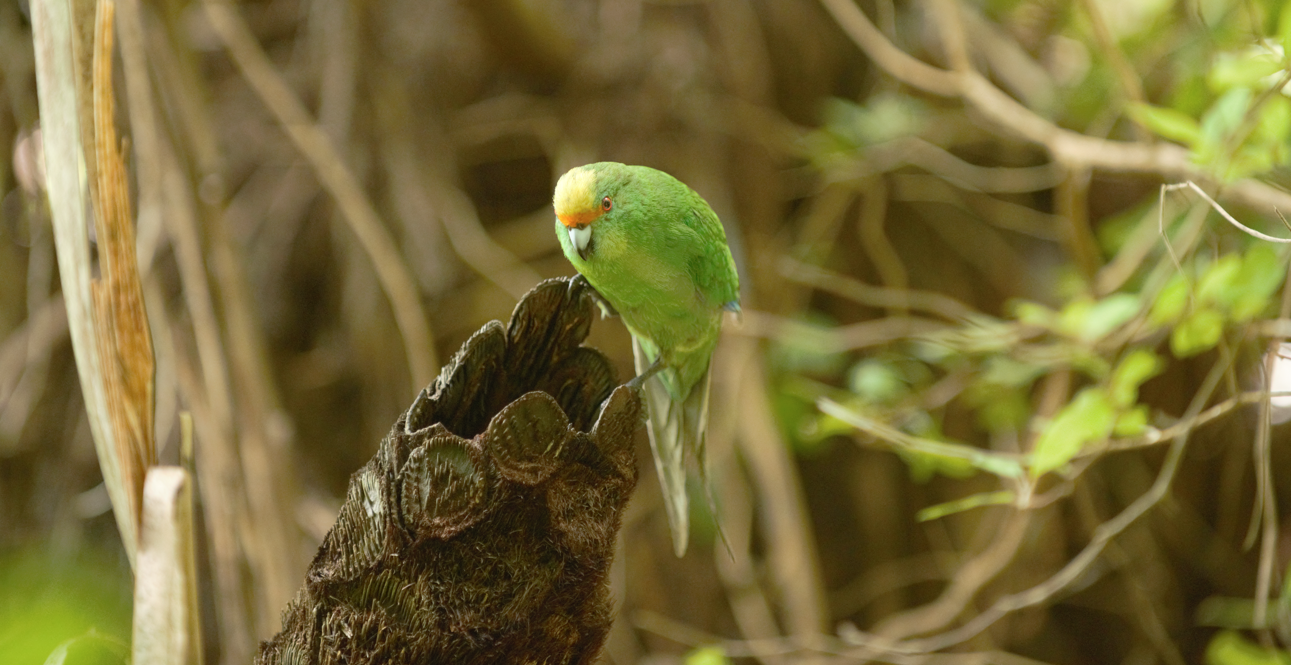Rare parakeet gets new Marlborough home


A kākāriki karaka/orange-fronted parakeet on Oruawairua/Blumine Island in 2023. Photo: Steph Kerrisk/Department of Conservation.
Oruawairua/Blumine Island in the Marlborough Sounds is now home for 40 new orange-fronted parakeets.
The critically endangered Kākāriki karaka, which has been declared extinct twice, were set free in four releases in February, March, April and May.
Department of Conservation Kākāriki Karaka Operations Manager Wayne Beggs says the transfer adds genetic diversity to the existing population of about 95.
Earlier in the breeding season, nine wild eggs from two clutches were successfully collected from predator-free Blumine Island.
They were raised at The Isaac Conservation and Wildlife Trust and Orana Wildlife Park in Christchurch before being transported to Oruawairua and acclimatising in aviaries for two days.

“These young birds will become part of the captive breeding programme to help improve its genetic diversity.
“It wasn’t long ago that kākāriki karaka was right on the brink of extinction, but we’ve made some meaningful gains.
“Every time we successfully establish a new population, we move a step closer to a secure future for this fragile species.”
The recovery programme is run by DOC and Te Rūnanga o Ngāi Tahu and works closely with partners like The Isaac Conservation and Wildlife Trust, Orana Wildlife Park and Auckland Zoo.
Te Rūnanga o Ngāi Tahu kākāriki karaka species recovery representative Yvette Couch-Lewis says she is happy to see kākāriki karaka from Ngāi Tahu takiwā boosting the existing wild population.
“I also want to acknowledge the kaitiaki rangers on Oruawairua who are working hard to ensure the manu thrive there,” she says.
The species has twice been declared extinct in 1919 and 1965 before being rediscovered in the late 1980s.
Wayne says the populations says overall numbers are not as significant to the species’ survival as established populations at new sites.
But he adds latest modelling suggests the wild population has also increased to more than 500.
“When you think there were less than 250 back in 2019, it’s remarkable progress in just a few years.”

Te Rūnanga o Ngāti Kuia Trust Kaiwhakahaere -Team Lead Wairau Ruihana Smith says this endeavour is about restoring the mauri and uplifting the mana of the motu.
“This is part of our ongoing involvement in this kaupapa.
“Returning ngā manu is a crucial piece of this puzzle.
“As kaitiaki, it's our responsibility to care for the whenua and its taonga. A huge mihi to Te Papa Atawhai, DOC, for their tireless mahi in restoring te taiao – we're immensely grateful for their support.”
Te Ātiawa o te Waka a Māui Kaitohutohu Taiao Renēe Love says the iwi “values our strengthened relationships with DOC and extended iwi with the translocation of the kākāriki karaka.”
“The DOC rangers show their passion for their mahi with every translocation we attend.”
